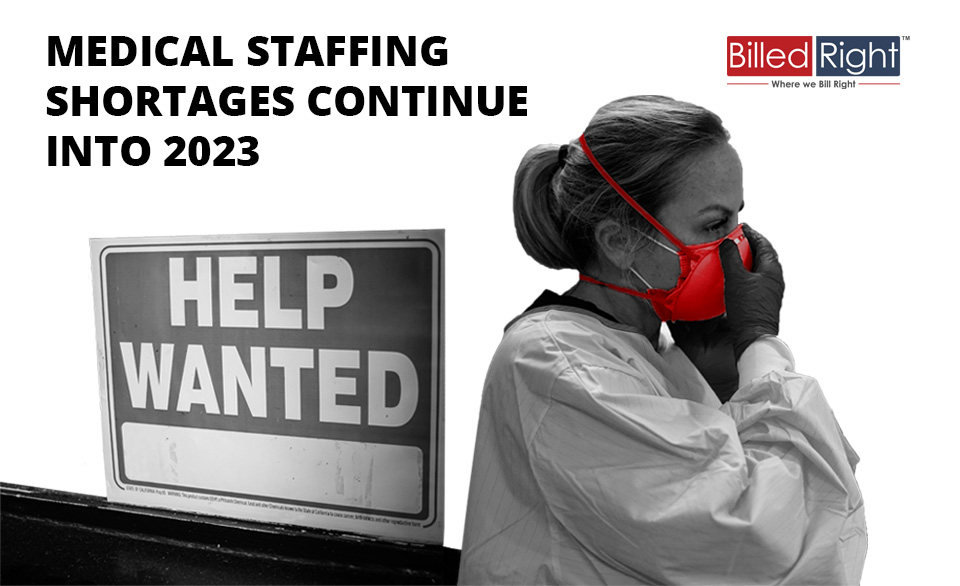The pandemic has been blamed for many of the problems happening in the world; however, it didn’t cause the shortage of healthcare workers. It did, however, compound it in a big way. It is estimated that nearly one in five healthcare workers has resigned since March 2020.
Not only is there a severe shortage of nurses and medical assistants, but there is also a shortage of case managers, administrative support, and medical billing staff. As a result, providers are finding it hard to run their practices due to the lack of administrative help. In addition, the shortage of clerical and administrative staff has also resulted in longer wait times for referrals, prior authorizations, or even getting phones answered. More importantly, overall short staffing is causing treatment delays, misdiagnoses, and unintentional medical errors as the existing workforce attempts to manage the same workload with less support.
In an MGMA poll from last September, 73% of medical group practices responded that staffing was the leading COVID-19 challenge going into 2022. Unfortunately, the shortage of healthcare workers is expected to continue to be an ongoing challenge for organizations as the strained workforce changes jobs for better pay and benefits, even going as far as to leave the healthcare industry altogether. A poll in February revealed that almost half of the respondents said that staff turnover rates worsened in the past quarter (41%) compared to 33% who noted it was about the same as previous quarters and 26% who said turnover had slowed recently.
And in April, MGMA sent out another poll asking medical practice leaders what their best tactic was to address staffing in 2022. Again, the majority reported “raise wages” at 56%, followed by “flexible schedules” at 29%, 10% stated “other,” and 5% said “temp workers.”
Of the respondents that stated “other,” here are some of the tactics that were included:
- Improve employee engagement efforts
- Improved benefits such as more time off and reduced schedules
- Adding referral bonuses for existing staff who bring in new hires
- Increasing automation of administrative tasks and use of bots
- Outsourcing for scribe work and medical coding
- Providing pre-emptive salary increases ahead of schedule
Impact on Patients
Not surprisingly, the healthcare staffing shortage is being felt by patients. Based on a CVS Health-Harris Poll National Health project, more than half of all Americans say they have directly felt the effects. From canceled appointments to delayed surgeries, shortened office hours due to lack of staff, to people stating their practitioner has stopped practicing medicine completely. By mid-2021, over 41% of adults in the United States decided to avoid or delay medical care due to COVID-19. And now, those adults are starting to reconnect with their providers and reassess their care after the pandemic lockdowns and restrictions. When providers need the income to help recover from the pandemic, a shortage of employees leaves them still losing revenue due to a lack of support staff and clinicians, lessening the number of patients they can see daily.
Outsourcing
One of the biggest opportunities to shore up your workforce, streamline workflows and save time and money is to contract out or outsource administrative tasks that are difficult or expensive to staff internally. These can include:
- Accounting
- Payroll
- Medical billing
- Credentialling
- And more
MGMA did a poll in March 2022 asking medical practices they will be outsourcing/automating in the next six months. Of those polled, 36% stated “revenue cycle,” 33% said “patient communication,” 9% said “clinical efficiency,” and 23% said “other,” which included things like medical billing, call center, and IT services. This poll shows that the medical worker shortage is forcing medical practice leaders to think outside the box on ways to streamline workflows and ensure they have the right workers for all the key roles in their practice.
How Billed Right Can Help
We understand how hard it can be to decide to outsource your medical billing. But partnering with a company that understands the importance of revenue cycle management can help ensure the financial health of your practice. Billed Right handles everything from eligibility verification to claim denial management to Account Receivable collections. As a strategic partner, we look to streamline your revenue cycle and operational management, thus helping you to increase revenue and grow your healthcare practice.
In addition to being a revenue cycle management company, we also offer front, mid and back-office services such as credentialing, fax sorting, and a virtual medical receptionist who can allow you to take even more of the administrative burden off your existing staff. By outsourcing these functions, you further streamline your workflow and allow your in-house staff the ability to focus on providing quality patient care.
Contact us today to learn more about how we can help support your practice by becoming a strategic partner.


 Insurance Eligibility
Insurance Eligibility Charge Posting
Charge Posting Documentation Review
Documentation Review Claim Submission
Claim Submission Denial Management
Denial Management Payment Posting
Payment Posting Accounts Receivables Follow-up
Accounts Receivables Follow-up Patient Collections
Patient Collections Reporting
Reporting Account Management
Account Management